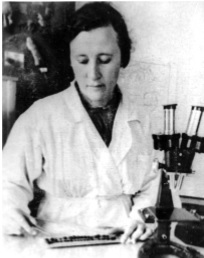
TSELISHCHEVA Larisa Mikhailovna (October 20, 1903 – July 21, 1957) was a Kazakhstani veterinary microbiologist and a prominent protozoologist scientist of Kazakhstan, acting senior researcher in the section of epizootology and microbiology (1936), Candidate of Biological Sciences (1946), senior researcher in the specialty “Parasitology” (1946), head of the protozoological laboratory of the Kazakh National Veterinary Institute (1942 – 1946; 1953 – 1957). She was awarded the medals “For Labor Distinction” (1945) and “For Valiant labor in the Great Patriotic War of 1941-1945” (1946).
She was born in the family of a clerk in the city of Bugulma, Kazan province.
In 1921, she received secondary education at the 2nd evening Soviet school of the II stage of the city of Novosibirsk.
In August 1924, she entered the Siberian (Omsk) Veterinary Institute, from which she graduated in February 1930.
From May 10 to August 5, 1930, she worked as an epizootologist in the city of Akhaltsikhe (Georgia). In August 1930, L.M.Tselishcheva, for family reasons, was forced to move to the city of Alma-Ata, where she entered simultaneously the positions of heads of the meat control station and the city sanitary veterinarian.
In March 1931, by order of the Veterinary Department of Kaznarkomzem L.M.Tselishchev was transferred to the Kazakh Scientific Research Veterinary Institute as a veterinarian of the diagnostic department.
In March 1932, she was appointed a junior researcher at the laboratory of cattle, in which L.M. Tselishcheva performed duties during 1934-1935, head of the laboratory of diseases of cattle. During these years, L.M. Tselishcheva carried out work on the treatment of widespread pneumonia (peripneumonia) in cattle, conducted research on the immunology of bovine peripneumonia and clarified the etiology of meningitis-like equine disease.
The completed works on microbiology and the resolution of the Qualification Commission of the VASKHNIL on their scientific assessment (1936) allowed L.M. Tselishcheva to submit a special candidate’s thesis for public defense by January 1, 1938.
In the 30s of the XX century, a lot of work was done, as a result of which the peripneumonia of cattle in Kazakhstan was eliminated by 1937. As a result, the laboratory for the study of diseases of cattle, mainly dealing with the problems of combating bovine peripneumonia, was abolished on March 16, 1937, and L.M. Tselishcheva was transferred to the arachno-entomological department of the protozoological laboratory as a senior researcher.
In March 1942, L.M. Tselishcheva was appointed head of the protozoological laboratory, she remained in this position until March 1946.
On April 28, 1944, at a meeting of the Scientific Council, L.M. Tselishcheva successfully defended her dissertation for the degree of Candidate of Biological Sciences on the topic “Fauna of ticks of the superfamily Ixodidae and their significance in the epizootology of hemosporidiosis of farm animals in Kazakhstan”.
From March 20, 1946 to June 1947, due to illness, L.M. Tselishcheva was forced to interrupt her work at the institute. After recovery, she resumed her work at the Institute, but as a senior researcher at the protozoological laboratory.
Since 1953, L.M. Tselishcheva was again appointed head of the protozoological laboratory, until 1957.
L.M. Tselishcheva is the author of more than 30 scientific articles. The main scientific works are devoted to veterinary arachnology. In this direction, she identified the fauna of ixodic mites-carriers of protozoal diseases of farm animals in Kazakhstan, and discovered new ticks for the USSR – carriers of bovine taileriosis.
Larisa Mikhailovna is buried in the Central Cemetery of the city of Alma-Ata.